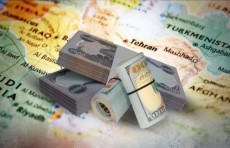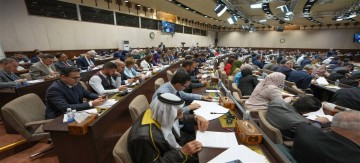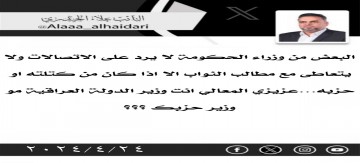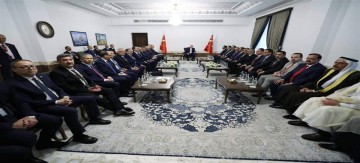مسألة البقاء على قيد الحياة
تاريخ النشر : 2017-11-14 10:43:05 أخر تحديث : 2024-04-23 20:11:24

سنديب واسلكار
حتى قبل بضعة أشهر، بدا تنظيم داعش لا يقهر، وفجأة من شهر آيار/ مايو إلى تشرين الأول/ أكتوبر، فقد معظم الأراضي التي سيطر عليها في العراق وسوريا، على الرغم من أن شبكته في أوروبا نشطة، وسوف تفقد البخار في الأشهر القليلة المقبلة، وقد جاء هذا التحول الدراماتيكي من خلال عمل عسكري وحيد من التحالف الدولي بقيادة الولايات المتحدة.
كان تنظيم داعش يسيطر على سد الطبقة، وهو أكبر سد في سوريا على نهر الفرات. واستخدمه لإخفاء كبار قياداته والسجناء ذوي القيمة العالية، إلى جانب بيع الكهرباء من محطة الطاقة الكهرمائية إلى نظام الأسد، كما كان لديها مكتب الضرائب هناك للتجار من العراق وسوريا لدفع فدية، يوعتقد تنظيم داعش أن التحالف الدولي لن يقصف السد خوفا من الفيضانات في جنوب سوريا.
وفي ليلة واحدة في أواخر آذار/ مارس، ساعدت قوات المارينز الأمريكية القوات الديمقراطية السورية، التي تتألف في معظمها من جماعة يبغ المسلحة الكردية، على الهبوط في المنطقة بطائرة هليكوبتر. استغرق الأمر ستة أسابيع من المعركة لتسليم السد، وبمجرد أن فقدت أكبر أصولها الاستراتيجية، استغرق الأمر أكثر من بضعة أسابيع ليخسر التنظيم معظم الأراضي الواقعة تحت سيطرته، ولكن هذا أثار مسائل أخلاقية وسياسية جديدة، ويتم التحكم في السد الآن من قبل وحدات حماية الشعب، وهي جهة مسلحة أخرى غير حكومية، وذلك لإن المنافسة على أصول المياه الاستراتيجية في الشرق الأوسط هي الآن بين الجماعات المسلحة والإرهابيين، وقد نتج ذلك عن فشل الدول في التعاون على مدى العقود القليلة الماضية.
وهناك خوف من أن يتنافس الإرهابيون أيضا على السيطرة على أصول المياه في أجزاء من أفريقيا في المستقبل.
في فبراير/ شباط، أصدر مجلس الأمن الدولي القرار 2341 الذي يدعو الدول الأعضاء في الأمم المتحدة إلى حماية البنية الأساسية الحيوية، بما في ذلك المنشآت المائية، بناء على جلسة مجلس الأمن 7818 بتاريخ 22 نوفمبر 2016 بشأن المياه والسلام والأمن.
ومع تزايد القلق بشأن التهديدات الأمنية للمياه، قدم الفريق العالمي رفيع المستوى والمعني بالمياه والسلام خطة شاملة لحماية الهياكل الأساسية للمياه من الهجمات الإرهابية والصراعات العنيفة، وبرئاسة دانيلو ترك، الرئيس السابق لسلوفينيا، واشترك في عقده 15 بلدا من جميع القارات، أصدر الفريق الرفيع المستوى تقريره في 14 أيلول/ سبتمبر. وتشمل توصيات الفريق أيضا التدابير المالية والدبلوماسية لتعزيز التعاون في مجال المياه العابرة للحدود نظرا لأن الأمن والتعاون مترابطان.
كما تعززت الجهود الرامية إلى تحقيق الأمن المائي التعاوني، حيث أعلن مجلس إنتراكتيون، وهو منظمة لرؤساء الحكومات السابقين، عن دعمه لمقترح التعاون في مجال المياه الذي أنشأته مجموعة الاستشراف الاستراتيجي، وهذا المقياس للتعاون في جميع أحواض الأنهار المشتركة البالغ عددها 286 حوضا في العالم يكشف عن وجود علاقة قوية بين التعاون في مجال المياه العابرة للحدود وتقلص مخاطر الحرب، ومن بين 146 بلدا من الأنهار والبحيرات المشتركة، هناك 22 زوجا من البلدان التي تشترك في الحرب أو الخطابات الحربية، هي نفسها التي تسجل في أسفل قاع التعاون في مجال المياه. الحائز على جائزة نوبل للسلام خوسيه راموس هورتا يحث العالم على استخدامه كأداة لمنع الصراعات.
إن أفريقيا تقود الطريق في مجال التعاون في مجال المياه. وتملك البلدان في السنغال وأحواض نهر غامبيا وتدير وتدير محطات الطاقة الكهرمائية والقنوات وخطوط الملاحة باعتبارها ملكا مشتركا يحل محل السيادة الوطنية. وتملك البلدان التسعة في حوض نهر النيجر أصولا مائية على الصعيد الوطني ولكنها تقدم طوعا حق النقض إلى الجيران قبل بناء البنية التحتية، وتتخذ السنغال مبادرة لنشر فكرة الأمن المائى التعاوني فى مجلس الأمن الدولى. كما تستضيف المنتدى العالمي للمياه في عام 2021 لتسليط الضوء على الصلة بين المياه والسلام والأمن، إثيوبيا والسودان ومصر تتخلى تدريجيا عن موقفها المواجهة على إدارة نهر النيل. وتقوم بلدان أفريقية أصغر مثل بوركينا فاصو، وغانا، وكوت ديفوار باتخاذ خطوات الطفل لإنشاء منظمات أحواض الأنهار. ولدى أوروبا والأمريكتين بالفعل منظمات قوية لحوض الأنهار. وبلدان الشرق الأوسط وآسيا أكثر ترددا في التعاون، مما يخلق قوسا كبيرا من انعدام الأمن المائي من الشرق الأوسط عبر وسط وجنوب آسيا إلى جنوب شرق آسيا.
إن مخاطر الحرب والإرهاب والفقر التي يواجهها ملياري شخص في أحواض الأنهار المشتركة في العالم النامي يمكن تجنبها في المستقبل إذا ما تم الاستثمار في أمن المياه التعاوني. ولذلك، خلص تقرير الفريق العالمي الرفيع المستوى المعني بالمياه والسلم إلى أن المياه لا تتعلق بالتنمية والصرف الصحي فحسب. إنها مسألة بقاء.
–
*سونديب واسليكار هو رئيس مجموعة الاستبصار الاستراتيجي، وهي مؤسسة أبحاث دولية.
………………………
A Matter of Survival
Sundeep Waslekar
Until a few months ago, the Islamic State or Daesh seemed invincible. Suddenly from May to October, it lost most of its territory in Iraq and Syria. Even though its network in Europe is active, it will lose steam in the next few months. This dramatic turnaround was brought about by a singular military action of the US led international coalition. The Islamic State controlled Tabqa, the largest dam in Syria on the Euphrates River. It used it to hide its top leaders and high value prisoners, besides selling electricity from the hydro-power station to the Assad regime. It also had its tax office there for traders from Iraq and Syria to pay ransom. The Islamic State believed that the international coalition would not bomb the dam for the fear of flooding southern Syria.
One night in late March, the US marines helped the Syrian Democratic Forces (SDF), mostly comprising of Kurdish armed group YPG, to land at Tabqa by helicopter. It took six weeks of battle for the Daesh to surrender the dam. Once it lost its biggest strategic asset, it took a few more weeks to lose most of the territory under its control. But this has raised new ethical and political questions. The dam is now controlled by YPG, another armed non-state actor. The competition for strategic water assets in the Middle East is now between armed groups and terrorists. This has resulted from the failure of the states to cooperate over the last several decades.
There is a fear that terrorists will also compete for controlling water assets in parts of Africa in the future.
In February, UN Security Council passed Resolution 2341 calling for UN member states to protect critical infrastructure, including water installations, building on the Security Council session 7818 of 22 November 2016 on water, peace and security.
With growing concern for security threats to water, the Global High Level Panel on Water and Peace has presented a comprehensive plan to protect water infrastructure from terrorist attacks and violent conflicts. Chaired by Danilo Turk, former President of Slovenia, and co-convened by 15 countries from all continents, the High Level Panel released its report on 14 September. The recommendations of the panel also include financial and diplomatic measures to foster trans-boundary water cooperation since security and cooperation are interdependent.
The efforts for cooperative water security are further strengthened as the InterAction Council, an organisation of former Heads of Governments has announced its support for the Water Cooperation Quotient, constructed by the Strategic Foresight Group. This barometer of cooperation in all of the world’s 286 shared river basins reveals strong a correlation between trans-boundary water cooperation and diminution of the risk of war. Of the 146 countries with shared rivers and lakes, 22 pairs of countries engaged in war or war rhetoric happen to be the same which score at the bottom of the Water Cooperation Quotient. Nobel Peace Laureate Jose Ramos Horta urges the world to use it as a conflict prevention tool.
Africa is leading the way in water cooperation. The countries in Senegal and Gambia river basins own and manage hydro-electric plants, canals and navigation lines as common property, superseding national sovereignty. The nine countries in the Niger River Basin own water assets nationally but voluntarily offer veto to the neighbours before building infrastructure. Senegal is taking an initiative to spread the idea of cooperative water security in the UN Security Council. It is also hosting the World Water Forum in 2021 to highlight the linkage between water, peace and security. Ethiopia, Sudan and Egypt are gradually giving up their confrontational attitude on managing the Nile River. And smaller African countries such as Burkina Faso, Ghana, Cote d’Ivoire are taking baby steps to establish river basin organisations. Europe and the Americas already have robust river basin organisations. The countries of the Middle East and Asia are most reluctant to cooperate, creating a mega arch of hydro insecurity from the Middle East via Central and South Asia to Southeast Asia.
The risks of war, terrorism and poverty that two billion people in shared river basins of the developing world face can be averted in the future if investments are made in cooperative water security. Therefore, the report of the Global High Level Panel on Water and Peace concluded that water is not merely about development and sanitation. It is a matter of survival.
—Sundeep Waslekar is President of Strategic Foresight Group, an international think tank*
Adel fakhir
المصدر: بغداد/ عادل فاخر/














